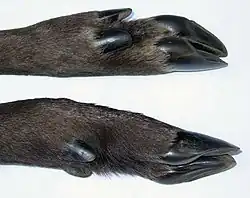artiodactyl
English

artiodactyls
Etymology
From scientific Latin Artiodactyla (suborder name), from Ancient Greek ἄρτιος (ártios, “even”) + δάκτυλος (dáktulos, “finger, toe”).
Pronunciation
- (UK) IPA(key): /ˌɑːtɪəʊˈdaktɪl/
Noun
artiodactyl (plural artiodactyls)
- (zoology) Any ungulate mammal with an even number of toes and belonging to the Artiodactyla, including pigs, sheep, deer, cattle, and most grazing animals. In contrast, horses have an odd number of toes and as such are not Artiodactyla, but Perissodactyla. [from 19th c.]
- 2013, Simon Winder, Danubia, Picador, published 2014, page 397:
- I have been unable to find out if these are linked in some way to the 1945 Budapest hippos, with the possibility this would create of a parallel history of Central Europe seen through the endurance of one brave African artiodactyl family.
Related terms
Translations
any ungulate mammal with an even number of toes
|
See also
This article is issued from Wiktionary. The text is licensed under Creative Commons - Attribution - Sharealike. Additional terms may apply for the media files.
